translated by Norman MacAfee with Luciano Martinengo
Where are the weapons?
I have only those of my reason
and in my violence there is no place
for even the trace of an act that is not
intellectual. Is it laughable
if, suggested by my dream on this
gray morning, which the dead can see
and other dead too will see but for us
is just another morning,
I scream words of struggle?
Who knows what will become of me
at noon, but the old poet is "ab joy"
[..]
Throughout the night, messages of hardship and hope will balance each other as union leaders, journalists and Human Rights activists from Burma, Belo-Russia and Zimbabwe share their views on the current needs and prospects in their dictatorial nations.
Journalists and writers from the Netherlands will join in this debate while documentaries and various acts will present a more tangible notion of what the situation is actually like in these countries. A hopeful light will be shed by a Ukrainian activist who played a central role during the 2004 orange revolution.
The ‘Dark night for dictatorships’ will take place at the Nieuwspoort, Lange Poten 10, Den Haag.
Click here for the location.
The ‘night’ will be presented in English. There is no entrance fee, but please register by e-mail. Send a message to nachtvandedictatuur@hotmail.com with your name, the name of the organization you represent (if relevant), address and telephone number.
27th of October 2005
Nieuwspoort, Lange Poten 10, Den Haag
This is an initiative of Zimbabwe Watch, Burma Centrum Netherlands, FNV Mondiaal and Free Voice.
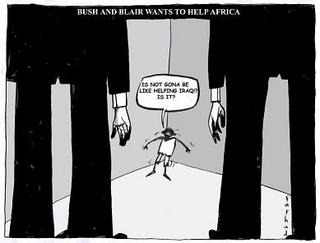 In The Independent - Remember Make Poverty History, anyone? It seems a long time ago that some 200,000 people flocked to Edinburgh to rally G8 leaders as part of an unprecedented campaign for global justice. That same day, 2 July, Bob Geldof organised free music concerts in nine countries under the Live8 banner. [..]
In The Independent - Remember Make Poverty History, anyone? It seems a long time ago that some 200,000 people flocked to Edinburgh to rally G8 leaders as part of an unprecedented campaign for global justice. That same day, 2 July, Bob Geldof organised free music concerts in nine countries under the Live8 banner. [..]The coalition's anger has intensified over revelations about Live8's paternalistic treatment of African campaigners and their relationship to corporations operating on the continent. Firoze Manji, the co-director of Fahamu, an African social justice network and a member of G-Cap, recounts how the African coalition had planned a concert in Johannesburg in early July to be held in one of the townships. According to Manji, a meeting of Oxfam GB, Curtis, Geldof and Kumi Naidoo cancelled it in favour of Live8.
Geldof, having excluded African artists from the London concert, eventually gave his blessing to "Africa Calling", a hastily arranged concert in Cornwall. The sponsors included Nestlé, accused of benefiting from the HIV/Aids epidemic in Africa by selling more milk substitute products; Rio Tinto, the world's largest mining corporation, condemned for alleged human rights and environmental abuses; and Britain's biggest arms manufacturer, BAE Systems - which, according Mike Lewis of the UK's Campaign Against Arms Trade, is "fuelling conflicts across Africa". Criticism of MPH's celebrity set has particularly angered Oxfam, and insiders believe the agency will lead a breakaway from other MPH members once the coalition disbands early next year, taking Comic Relief and Bono's charity - Debt Aids Trade Africa - with it. Given Oxfam's free-trade solutions to Third World poverty, and - along with Curtis, Bono and Geldof - its leadership's close relationship to New Labour, this scenario could be an encouraging development for efforts to realign MPH with the "global justice movement". [..]
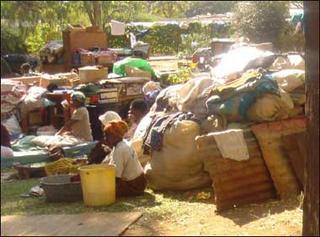 "This time a thrashing; next time the dogs": persistent harassment of Zimbabwe's poor - Sokwanele Report: 24 October 2005
"This time a thrashing; next time the dogs": persistent harassment of Zimbabwe's poor - Sokwanele Report: 24 October 2005"... Consider the history of another - let's call him Thabo because he has not succumbed to death yet and therefore his identity must be protected in the police state that Zimbabwe has now become. Thabo is in his 60s. Our reporter saw him collecting a few plastic containers of water from a water pipe not far from where he had made a temporary (and well-concealed) shelter for himself in the bush. His parents came to what was then Rhodesia from Malawi half a century ago. When they died Thabo found employment as a security guard at Victoria Falls. There he met his bride-to-be whose home was at Nyathi. The couple married and went to live at Nyathi. However as the liberation war intensified Nyathi became an uncomfortable place to live with all the military activity in the area. Thabo and his wife therefore moved to Matobo on the other side of Bulawayo with their four children. They were happy enough living there, but after independence they found the area was being targeted by the notorious 5th Brigade. Mugabe's maniacal genocide programme, Gukurahundi, was just getting under way. The family moved back closer to Bulawayo and found shelter where they could, at Killarney. Thabo's wife has since died and his children left home, leaving this elderly widower to fend for himself as best he can. Then in June 2005 Mugabe's second military-style operation to remove the human "debris", code-named Operation Murambatsvina, swept through Killarney. As he watched his home of 20 years being razed to the ground by Mugabe's black-booted agents of terror, Thabo took to the bush where he remained in hiding for a number of weeks. While in hiding he did not even dare to light a fire to cook a meal for fear of alerting the riot police. During this time he lived off scraps of food, including a few stale buns, which he managed to scavenge off others almost as desperate as himself. Finally, having nowhere else and no one else, to turn to, Thabo returned to Killarney, rebuilding the shack which had once been home. It was a vain gesture of hope (or was it defiance?) for a few weeks later the Mugabe storm troops swept through the area again, destroying his and the few other shacks which had been re-occupied. Leaving Thabo with only the bush to call home." [..]
CitySpeak is an investigation of how data acquired from an urban environment’s virtual networks can be used to investigate the same urban space’s physical environment. Using the Ile sans fil hotspots in Montreal, CitySpeak will select several locations in the city that are rich nodes of both virtual and real-world traffic and sample the geo-encoded data related to these particular locations. The dynamic qualities of the data will be processed using a database called Next Text to construct “texts” that interpret the data and to determine how the texts will be represented visually. The resulting stream of text will be layered back onto the locations using both very intimate (PDAs) and very public (large-scale projections) technology. [..]
Seven things i plan to do
1. Live quiet - with stable fat webconnection - on Eolian island (above Palermo)
2. Pass the winter in New Delhi
3. Eat twelve eggplant dishes in Baghdad a.s.a.p.
4. Write three books
5. Quit smoking
6. Take capitalism personal and make money
7. Learn arabix
Seven things i can do
1. Stream the time, with you, you, you and you
2. Write poetry
3. Learn arabix
4. Take a walk in the park without umbrella while heavy rains...
5. Tick time away on the keyboard
6. Process quite some streams of information
7. Confuse some streams of information (recently: exchange Syria for Zimbabwe)
Seven things i can't do
1. Eat twelve eggplant dishes in Baghdad (now)
2. Quit smoking
3. End a war or two
4. Become a famous singer / tenor-saxophone player in a year
5. Install a significant amount of enlightened politicians throughout the world
6. Sit quiet and read that pile of waiting books
7. Exchange Syria with Zimbabwe
Seven things i say most often
1. ma porcamiseria!
2. how can people believe this shit?
3. it is very important!
4. nohh, this dark dutch weather...
5. hey, how are you?
6. brrrrr (cold)
7. we need humor!
Seven people i want to pass this tag to
1. Jaromil / Tazebao
2. Baghdad Dweller
3. Jebba
4. Vincent
5. A Free Writer
6. The Iraqi Roulette
7. Salam Pax
8. The Jarrars (4x :)
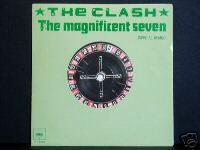 *Coming soon!* In the meantime:
*Coming soon!* In the meantime: Ring! ring! it’s 7:00 a.m.!
Move y’self to go again
Cold water in the face
Brings you back to this awful place
Knuckle merchants and you bankers, too
Must get up an’ learn those rules
Weather man and the crazy chief
One says sun and one says sleet
A.m., the f.m. the p.m. too
Churning out that boogaloo
Gets you up and gets you out
But how long can you keep it up?
Gimme honda, gimme sony
So cheap and real phony
Hong kong dollars and indian cents
English pounds and eskimo pence
/../
Multitudes, Creative Organisation and the Precarious Condition of New
Media Labour
:: Dawn of the Organised Networks ::
Geert Lovink & Ned Rossiter
At first glance the concept of "organised networks" appears oxymoronic. In
technical terms, all networks are organised. There are founders, administrators,
moderators and active members who all take up roles. Think also back to the early
work on cybernetics and the "second order" cybernetics of Bateson and others.
Networks consist of mobile relations whose arrangement at any particular time is
shaped by the "constitutive outside" of feedback or noise.[1] The order of
networks is made up of a continuum of relations governed by interests, passions,
affects and pragmatic necessities of different actors. The network of relations is
never static, but this is not to be mistaken for some kind of perpetual fluidity.
Ephemerality is not a condition to celebrate for those wishing to function as
political agents.
Why should networks get organised? Isn't their chaotic, disorganised nature a good
thing that needs to be preserved? Why should the informal atmosphere of a network
be disturbed? Don't worry. Organised networks do not yet exist. The concept
presented here is to be read as a proposal, a draft, in the process of becoming
that needs active steering through disagreement and collective elaboration.[2]
What it doesn't require is instant deconstruction. Everyone can do that. Needless
to say, organised networks have existed for centuries. Just think of the Jesuits.
The history of organised networks can and will be written, but that doesn't
advance our inquiry for now. The networks we are talking about here are specific
in that they are situated within digital media. They can be characterised by their
advanced irrelevance and invisibility for old media and p-in-p (people in power).
General network theory might be useful for enlightenment purposes, but it won't
answer the issues that new media based social networks face. Does it satisfy you
to know that molecules and DNA patterns also network? [..]
Read the whole at Nettime
A teacher asks her class: "If there are 5 birds sitting on a fence and you shoot one of them, how many will be left?" She calls on little Johnny.
"None, they all fly away with the first gunshot."
The teacher replies: "The correct answer is 4, but I like your thinking."
Then Little Johnny says: "I have a question for YOU. There are three women sitting on a bench having ice cream. One is delicately licking the sides of the triple scoop of ice cream. The second is gobbling down the top and sucking the cone. The third is biting off the top of the ice cream. Which one is married?"
The teacher, blushing a great deal, replies, "Well I suppose the one that's gobbled down the top and sucked the cone."
"The correct answer is the one with the wedding ring on... but I like your thinking."
Nettime - A battle has erupted over who governs the internet, with America demanding to
maintain a key role in the network it helped create and other countries demanding
more control.
The European commission is warning that if a deal cannot be reached at a meeting
in Tunisia next month the internet will split apart.
At issue is the role of the US government in overseeing the internet's address
structure, called the domain name system (DNS), which enables communication
between the world's computers. It is managed by the California-based,
not-for-profit Internet Corporation for Assigned Names and Numbers (Icann) under
contract to the US department of commerce.
A meeting of officials in Geneva last month was meant to formulate a way of
sharing internet governance which politicians could unveil at the UN-sponsored
World Summit on the Information Society in Tunis on November 16-18. A European
Union plan that goes a long way to meeting the demands of developing countries to
make the governance more open collapsed in the face of US opposition. [..]
The “pornography for war gore” story that is in the New York Times, Guardian and the London Metro today (Sept.05) is an excellent example of a story flowing between the blogosphere and mainstream news outlets.
The story, about soliders apparently trading grisly digital camera snaps of dead Iraqis and Afghans for access to the Amsterdam-based pornographic web site nowthatsfuckedup.com, was first brought to the world’s attention in October, 2004, when the the the ..." [..Posted by Martin at September 28] Who Killed Massoud? --- 1x52' Investigative documentary ---
Who Killed Massoud? --- 1x52' Investigative documentary --- Why was the Afghan Resistance leader murdered? The tragedy of September 11 eclipsed the assassination of an important leader…
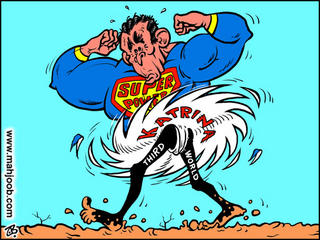 I got mail: "Remember that HILARIOUS film "Wag the Dog"? You know - the one with the presidential aide (played by Robert De Niro) and the Hollywood producer (Dustin Hoffman) who cook up an imaginary conflict with ALBANIA, then produce it with sets actors etc and finally successfully beam it straight into America's consciousness so as to distract public opinion from a nasty sex scandal involving the President and thereby secure his reelection.
I got mail: "Remember that HILARIOUS film "Wag the Dog"? You know - the one with the presidential aide (played by Robert De Niro) and the Hollywood producer (Dustin Hoffman) who cook up an imaginary conflict with ALBANIA, then produce it with sets actors etc and finally successfully beam it straight into America's consciousness so as to distract public opinion from a nasty sex scandal involving the President and thereby secure his reelection. WELL, the real-life equivalent to all that (minus the sex scandal) in the lead-up to the 2003 invasion of "Mess'o Potamia" (to quote the brilliant Jon Stewart's The Daily Show - check it out on Crooks and Liars) was called the White House Irak Group or WHIG and you can find a list of all the little De Niros and Hoffmans HERE: WHIG"
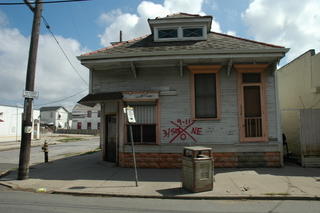 Jeblag - "The '9-11' means someone checked the house on September 11th. The “0″ at the bottom means zero bodies were found. I don’t know what the other text means."
Jeblag - "The '9-11' means someone checked the house on September 11th. The “0″ at the bottom means zero bodies were found. I don’t know what the other text means." B told: "... been exposed to depleted Euranium radiation ... got diagnostic tests and were found exposed ... the US army used around 300 tons in the first gulf war ... and more than 2300 tons in the last freedom war ..."
B told: "... been exposed to depleted Euranium radiation ... got diagnostic tests and were found exposed ... the US army used around 300 tons in the first gulf war ... and more than 2300 tons in the last freedom war ...":: DEPLETED URANIUM EDUCATION PROJECT ::
:: Jane's - Your query for: Keyword(s)=depleted uranium, matched 34 documents
:: RISQ - Iraq / Depleted Uranium
:: Consequences of Depleted Uranium - Report transmitted by Dutch actuality TV TweeVandaag (4-9-04). Click on 'Video' and choose your best option.
-->> And a Short description of this report with expert-names was hastily put on Streamtime September 5. 2004
:: ICBUW - International Coalition to Ban Uranium Weapons
:: Beyond Treason :: This 89 minute film presents comprehensive documentation from United States Government archives of a massive cover-up
Is it a combination of overlapping exposures?
A growing number of scientists and respected experts in their fields have been coming forward to share their research and first-hand knowledge of official betrayal. [..]
:: And there is Dr. Jawad Al-Ali, Director of the Oncology Center, Basrah, Iraq: "During the recent war (gulf war 3), again the depleted uranium was used extensively around the city of Baghdad, city of Babylon, city of Karbala, city of Najef and in the city of Basrah, which is still suffering the effects of the depleted uranium of the gulf war 2 (1991). According to a report from the Guardian newspaper 1000-2000 tons were delivered on 51 local areas in different Iraqi cities. I witnessed the A-10 planes for three days delivering the depleted uranium rounds against the tanks and armor vehicles near Basrah airport and at the southern parts of Basrah city. The estimated amount of this weapon of mass destruction is exceeding the amount used in gulf war 2 (1991)." [..]
 ... a disposable piece of anti-literature which combines wild flights of fantasy, Bataillean erotic excess, half-baked poetry and ‘primitive’ illustrations with sober theories of cultural and social revolution. Its accomplishment is to create a book which is non-serious and unimpressive in its style, yet imaginative and inspiring in its political passion. (Mute)
... a disposable piece of anti-literature which combines wild flights of fantasy, Bataillean erotic excess, half-baked poetry and ‘primitive’ illustrations with sober theories of cultural and social revolution. Its accomplishment is to create a book which is non-serious and unimpressive in its style, yet imaginative and inspiring in its political passion. (Mute)A: Bukaka is a relentless, tasteless, walking revolution, she spits and swallows, is weak and indestructible. Her philosophy does not quote Foucault and other dead white male jerks: it is barboodas, klikusha, pfush. She has no footnotes. Blood, spit and cum boil where she walks. Would make an excellent weekly comic. I know you are not Raymond Pettibon: he never did anything that exciting.
A&B: No, Bukaka is not really a comic book with a savage and sexy heroine but rather the story of a mad and oppressed migrant who tries to find radical political methodologies and ways of living. It is more a metaphoric portrait of a current left activist than a spitting machine. It is a story of personal and ideological disasters, a story of a naïve but brave soul who can’t obey to a world of masters and slaves. As well it is a metaphor for the danger of discourses and how these discourses exist in bodies. Besides, this book is about the impossibility of any ‘literature’, any aesthetics now.
Alexander Brener and Barbara Schurz are poets, caricaturists, novelists, theorists, percussionists, interventionists, artists, singers, non-professional wrestlers and authors of extraordinary tracts such as Was tun? (Edition Selene, 1999) and Demolish Serious Culture!!! (Edition Selene, 2000), much quoted acts such as obliterating official graffiti on the Berlin Wall with grey paint or screaming loudly in the palaces of contemporary art. Click the Bukaka Spat here to read some more
Tribe and Proliferation of guns to terrorise neighbours (nov. 2004)
"The Karamonjong one of Africa’s notorious tribes and proliferation of guns for terrorizing their neighbours. ---The art of scaling down on African tribal skirmishes.
The Karamojong tribe, one of few African tribes that have continued to live in an 18th century lifestyle, has continued with barbaric acts of raiding their neighbours (tribes) and gone on practicing this at the expense of their own clan members.
Karamojong from Karamoja located in the North Eastern part of Uganda (small East African country) are a normadic tribe whose livelihood depends on keeping cattle. Located in a 27,200 square kilometer area of semi-arid savannah, bush and mountains, the region has dominant groups including the Dodoth in the north, the Jie in the central region, and, in the south, a cluster of closely related ethnic groups known as Bokora, Matheniko, and Pian all of whom are referred to generally as the Karimojong in the Karamoja Region
As described, the area has an ecological feature as a semi-arid living, varying rain pattern, mostly during June and September. This leaves the area greatly exposed to drought and therefore failing crop production, providing them with minimal options regarding livestock maintenance." [..] Read it here
Friday the 7th of October @ Club 11
Program
5.00 PM Spectacular ScratchWorx performance by kids and the ScratchWorx team, guests
6.00 PM Presentation of Connected! LiveArt catalogue
ScratchWorx is an audiovisual live performance vj/dj tool for young people. With their own images and music they are able to produce their own perfomance, mixed on the ScratchWorx console.
ScratchWorx is used in secondary schools in arts and culture-courses and at cultural youth-events. From October onwards ScratchWorx is used in the ?Hier Sta Ik? theatertour of Dutch/Marroccan Rap-artist Ali B. http://scratchworx.waag.org
ScratchWorx is an application that is developed in the MultimediaN research-program where knowledge-institutes, companies and social institutions co-operate to develop high level multimedia applications. http://www.multimedian.nl
Right after the event there is the presentation of ?Connected! Live Art? catalogue, the documentation of the Connected! Program thet enabled artists to experiment with networked art. http://connected.waag.org
Club 11_bar_restaurant_club, Oosterdokskade 3-5, Post CS, Amsterdam
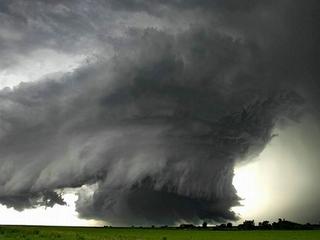 BOSTON, Oct 5 (Reuters) - Warming ocean waters may have tainted Alaskan oysters with a bacteria that triggered four outbreaks of illness on a cruise ship among people who ate the shellfish raw, researchers reported on Wednesday."The rising temperatures of ocean water seem to have contributed to one of the largest known outbreaks of Vibrio parahaemolyticus in the United States," said Joseph McLaughlin of the Alaska Department of Health and Social Services, referring to the bacterium responsible for outbreak. He and his colleagues said 62 people fell ill on four week-long cruises in July 2004. Vibrio parahaemolyticus is the most common cause of seafood-related illness in the United States. [...]
BOSTON, Oct 5 (Reuters) - Warming ocean waters may have tainted Alaskan oysters with a bacteria that triggered four outbreaks of illness on a cruise ship among people who ate the shellfish raw, researchers reported on Wednesday."The rising temperatures of ocean water seem to have contributed to one of the largest known outbreaks of Vibrio parahaemolyticus in the United States," said Joseph McLaughlin of the Alaska Department of Health and Social Services, referring to the bacterium responsible for outbreak. He and his colleagues said 62 people fell ill on four week-long cruises in July 2004. Vibrio parahaemolyticus is the most common cause of seafood-related illness in the United States. [...]
Jebba's (AP) — Hours after Hurricane Katrina slammed into the Gulf Coast and knocked out telecommunications across much of the region, Mac Dearman visited shelters in northern Louisiana to connect telephones.
Dearman doesn’t work for a phone company.
[..] Just as Katrina proved the vulnerability of traditional telephone and cellular networks, it also showed how Internet-based technologies could be used to speedily re-establish links with the outside world. [..] “It’s pretty clear that it was the folks out in the field who did some amazing heroics to get communications back up,”“We need to move toward a system where people are empowered to do what they can do.” said Carl Malamud, chief technology officer of the Center for American Progress think tank. [..] Read it on the Blag
 Sweet, sweet America!
Sweet, sweet America!(music + literairy fragments of american popculture + there is an english section)
with a special wink to The Kid




